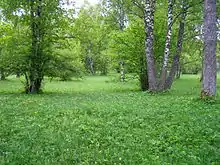Wooded meadow
Wooded meadows (also named wood-meadows, park meadows, etc.) are ecosystems in temperate forest regions. They are sparse natural stands with a regularly mown herbaceous layer.

While frequent throughout Europe during the Medieval period and before, wooded meadows have largely disappeared. Wooded meadows originated from the practices of hunter-gatherer communities. They were important in terms of social organization around a natural resource and determined much of the community's interactions with the natural world.[1] In the early 20th century, wooded meadows were used for fruit cultivation in Sweden, however their prevalence has decreased substantially due to changes in land management and a movement toward more intensive types of agroecosystems.[2] The more typical, calcicolous wooded meadows are common around the Baltic Sea.[3]
Wooded meadows have high species richness. In some of the current Estonian wooded meadows, world record species densities have been recorded (up to 76 species of vascular plants per square meter).[4]
Literature
- Kull, Kalevi; Kukk, Toomas; Lotman, Aleksei 2003. When culture supports biodiversity: The case of wooded meadow. In: Roepstorff, Andreas; Bubandt, Nils; Kull, Kalevi (eds.) 2003. Imagining Nature: Practices of Cosmology and Identity. Aarhus: Aarhus University Press, 76–96. (pdf)
References
- Kull, Kalevi. "Kull & Kukk & Lotman - When culture supports biodiversity: The case of wooded meadow". Cite journal requires
|journal=(help) - Gunnarsson, A. (2010). "Wooded Meadow Gardening in Southern Sweden during the Past Centuries". Acta Horticulturae. 881 (881): 967–972. doi:10.17660/ActaHortic.2010.881.161.
- Kull, Kalevi; Zobel, Martin (1991-10-01). "High species richness in an Estonian wooded meadow". Journal of Vegetation Science. 2 (5): 715–718. doi:10.2307/3236182. ISSN 1654-1103. JSTOR 3236182.
- Kukk, Toomas; Kull, Kalevi 1997. Wooded Meadows [Puisniidud]. - Estonia Maritima 2: 1–249.
